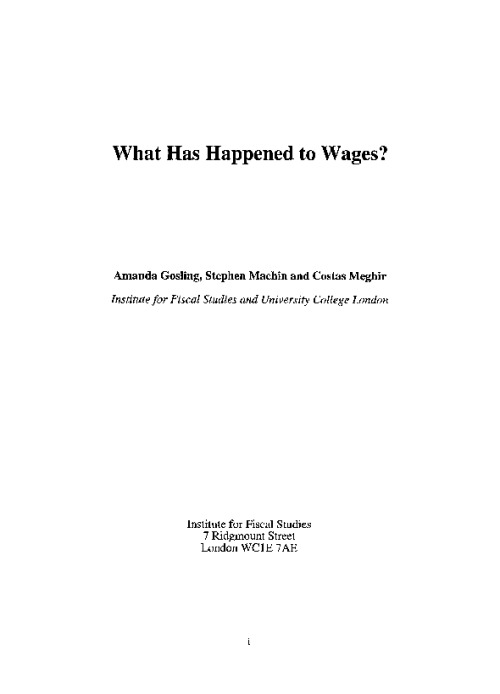Downloads

comm43.pdf
PDF | 1.16 MB
The gap between those who earn the most and those who earn the least in the UK is growing rapidly and in 1992 was larger than it had been at any time this century. It is one of the major factors underlying the rise in the inequality of household income and in poverty levels. This, together with its implications about the way the labour market is changing, makes it one of the most important issues facing policymakers today.
Authors

Amanda Gosling

Research Fellow Yale University
Costas is a Research Fellow of the IFS and a Professor of Economics at Yale University and a Visiting Professor at University College London.

Stephen Machin
Report details
- DOI
- 10.1920/co.ifs.1994.0043
- ISBN
- 978-1-873357-38-5
- Publisher
- IFS
Suggested citation
A, Gosling and S, Machin and C, Meghir. (1994). What has happened to wages?. London: IFS. Available at: https://ifs.org.uk/publications/what-has-happened-wages (accessed: 30 June 2024).
More from IFS
Understand this issue

If you can’t see it, you can’t be it: role models influence female junior doctors’ choice of medical specialty
24 April 2024

Sure Start achieved its aims, then we threw it away
15 April 2024

The NHS waiting list: when will it come down?
29 February 2024
Policy analysis

How do the last five years measure up on levelling up?
19 June 2024

The Conservatives and the Economy, 2010–24
3 June 2024

A decade and a half of historically poor growth has taken its toll
3 June 2024
Academic research

The impact of labour demand shocks when occupational labour supplies are heterogeneous
28 June 2024

Interpreting cohort profiles of lifecycle earnings volatility
15 April 2024

Labour market inequality and the changing life cycle profile of male and female wages
15 April 2024